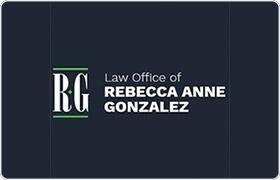Knippa Divorce & Family Law Lawyer, Texas
Sponsored Law Firm
-
 x
x

Click For More Info:
-
Law Office of Rebecca Anne Gonzalez
10101 Reunion Place Suite 615 San Antonio, TX 78216» view mapDivorce & Family Law Continuing The Gonzalez Legacy
At the Law Office of Rebecca Anne Gonzalez, my goal is to make certain you feel taken care of. My team and I work hard to protect what is important to you.
800-735-1530
Rogelio Martin Munoz
Family Law, Criminal, Consumer Bankruptcy, Personal Injury
Status: In Good Standing
Richard O. Gonzales
Commercial Real Estate, Immigration, Family Law, Criminal
Status: In Good Standing Licensed: 50 Years
Pedro G. Nieto
Family Law, Divorce & Family Law, Criminal
Status: In Good Standing Licensed: 47 Years
 Rebecca Gonzalez San Antonio, TX
Rebecca Gonzalez San Antonio, TX Practice AreasExpertise
Practice AreasExpertise
